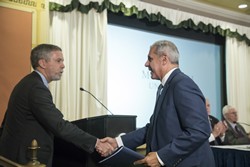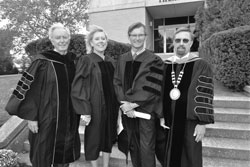The University hosted its second open-forum panel discussion with the Public Servant-in-Residence program on bridging the partisan divide in Wilson Auditorium on Friday, Nov. 30.
The Office of the President and the Department of Political Science and Sociology coordinated the Public Servant-in-Residence program and is featuring former New Jersey state-Senator Joe Kyrillos (R-Monmouth) as its 2018-2019 Public Servant-in-Residence.
Along with Kyrillos, other panelists in this discussion included: Patrick Murray, Director of the Polling Institute; Julie Roginksy, Democratic strategist and founder of Optimus Communications; Jeanette Hoffman, Republican strategist and President of Marathon Public Affairs; and David Chen, a New York Times reporter.
During the discussion, the panelists evaluated the current political climate and causes of polarization, as well as how this polarization could reduce efficiency in government and what can be done to bridge the divide between political parties.
“Partisanship in party politics are nothing new in America,” said Kyrillos. “Having spent the last three decades, if you can believe it, in public office, I can tell you from personal experience that our politics have become the least over that time span, angry and more toxic.”
Kyrillos explained that when he began his career as a state assemblyman in 1988, partisanship did exist, but there was a common understanding amongst leaders to combat it. “We had different priorities, we had different policy objectives, we strategized how to advance those objectives and gain the upper hand, off course we did all those things, but I seem to remember a culture of collegiality among legislatives much more so than today,” he explained. “At our best on both sides of the aisle there was an underlying willingness to have good faith negotiation strike principle compromises, to make the state better and make it stronger.”
He continued and noted that political differences are a natural and healthy part of democratic politics, and previous generations of leaders they did strike major compromises on issues like social security and the federal budget. “Political parties can provide ways for citizens to organize around shared principles and move the country for the state forward in a better direction,” said Kyrillos. However, he said, “When we develop habits of sacrificing for the long-term good of the people for a short-term advantage, for the party when we think we have nothing to learn or gain from talking to the other side when we won’t agree to compromises that we know are important for the public good.”
Hoffman said that news networks have also potentially driven partisanship in politics. “They are unapologetically partisan right now,” he said. “The changing media landscape really rewards instant gratification and partisan conflicts; the more inflammatory your words are, the more hyperbolic, the more likely it is to be picked up.”
He continued, “The way media success is evaluated has completely changed as well. It’s not how many newspapers you sell or how many subscriptions you have, it is all about clips. There is just not a system that rewards consensus building. It’s boring to be safe and see consensus. The people who are watching these shows thrive on outrage and that’s why we have the system that we have.”
“Let’s face it, it’s the best thing in politics and also the worst at the same time,” said Hoffman. “It’s hard to hate people up close, but unfortunately that opposite is also true. It is very easy to be nasty, very easy to be angry behind a keyboard, or on your iPhone when you never have to meet that person and face them. Our behavior on social media is just as self-selecting as it is with cable news. We follow the people who think like us, we follow our echo chamber. We agree with their tweets, we like their tweets, we retweet them, and then we bash the people we don’t agree with.
Murray explains that he sees polling as something more than just predicting elections, but as something that identifies what connects people and how their interests are represented. “I saw polling as a tool at which we could help elevate and bring the voice of the public to the table on important issues,” he said. “Not because we were polling and saying do you agree or disagree with this proposal, but to bring to the forefront this is what is important to us, this is what is driving us, this is what we’re concerned about day to day, and we need our public officials to respond to that.”
Murray said that, in a recent poll released by the Polling Institute, only one in five Americans believe that the country agrees on what its core values are. “There is just an underlying undercurrent of government is simply not paying attention. What is more important to those in government are scoring political points, consolidating their power basis, and there is always this balance between consolidating your own power base and serving the public. We’re way unbalance, way unbalanced. We need to have leaders in elect office who see it as in their self-interest to preserve the institution,” said Murray.
“Politicians looking to get elected are playing to their base. They are not trying to seek some kind of consensus to get elected. They know the people that are turning out in red districts are really conservative and, in many cases, the primary election is more important than the general election so they’re running really far to the right. The same could be said on the other side in the blue districts that are getting bluer and more liberal.” (Hoffman)
Roginsky believes that television news stations do not do a great job focusing on politics since the purpose of this form of media is to entertain. “I went to the republican convention with Fox in 2016 and they’re were the same people sending me hate mail literally to the point where I had to go with armed security,” said Roginsky. “They were coming up to me, asking for selfies, I’m thinking they hate me. The reality is as, Hoffman said, it is harder to hate up close because it’s much more of an entertainment celebrity concept than it is an informative concept for people that’s problematic and leads to much more partisanship.”
Roginsky encourages students to interact with people who think differently. “Spend some time finding people who are not like minded,” she said. “It’s great, you might not be convinced with their argument, but I think you would benefit tremendously from being exposed to different world views.
Roginsky continued, stressing that having more discussions and/or panels like this on discussing the issues today, will be beneficial moving forward in the future: “I remember seeing a study, maybe two years ago, where the number one issue for republicans was terrorism and national security and for democrats it was gut safety.” Roginsky’s main concern is the lack of gun legislation in this country. He stressed that Republicans worry about bombings in main stream public areas like Time Square. Roginsky further stressed that people do not think of global issues in the same way, making it a priority for government officials to create polls and conduct research focusing on the various approaches to resolving global issues.
Chen believes that bridging the gap is an important subject that young people should grasp as well. “I think it is important for students to try to bridge the partisan divide, because the more exposure they have to folks of different backgrounds and different point of view,” said Chen. The more informed they are, the better chance there is that they can talk to other people and spread the word. Chen added that students learning from other folks exposes them to other perspectives, which is crucial to them in their progress to becoming well-rounded and open-minded individuals. It is most beneficial for people to be exposed to different walks of life at a young age because in that point in time, they are the most impressionable and eager to learn new ideas. “It’s more beneficial and you will get more out if then playing fortnite,” said Chen.
The next Public Servant-in-Residence open-forum will be held during the end of February and that panel will focus on jobs and the economy.
PHOTO COURTESY of Monmouth University



